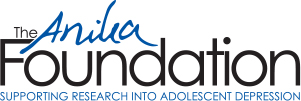The Anika Foundation speaks at Ravenwood School for Girls
Depression, self harm and risk of suicide is such a big issue for our young people, both in Australia and all around the world.
Mission Australia’s National Youth Survey 'December 2005' results have once again shown that suicide and self-harm are the most pressing issues for young Australians. The survey of 11,300 young people found that 94% of 11 to 24 year-olds ranked suicide and self harm, physical and sexual abuse, and family conflict as issues of most concern. Almost 42% of people surveyed ranked suicide and self harm in their top three issues of concern, and one in three young people was concerned about depression.
As an illustration of how big an issue this is, the Board was surprised recently that in a vote on which charity they would support for their annual fund raising activities, Year 9 girls at Ravenswood School For Girls chose ‘The Anika Foundation’ with a landslide majority. A large number of well known charities were also presented upon, but the teacher who contacted the Foundation said: “we were amazed at the outcome, it was not even close”. This mirrors the Mission Australia findings. If this is a huge issue for our children, it has to be a huge issue for all of us.
The Anika Foundation would like to thank Ravenswood for inviting us to address the Year 9 girls about the aims and work of the Foundation. We would also like to thank Year 9 girls; Annabelle and Sophie, for the good work they did in presenting the Foundation to the girls, and helping to raise awareness about this issue.
The launch function at Ravenswood was attended by:
- Adrian Wignall (Anika's father), Chairman of the Foundation who spoke about its aims
- Danae Wignall (Anika's sister), who also spoke
- Tate Dogan (Anika's brother), who took photos for the website of which he is the administrator.
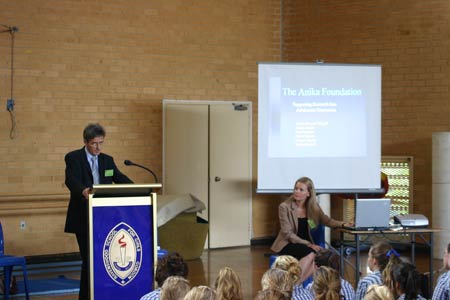
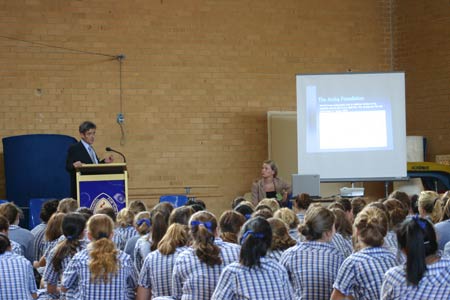
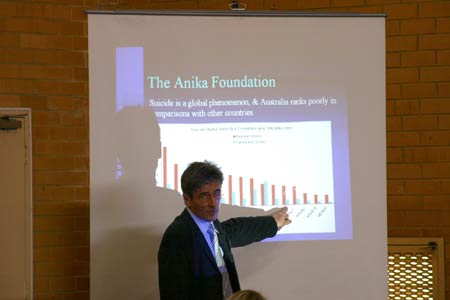
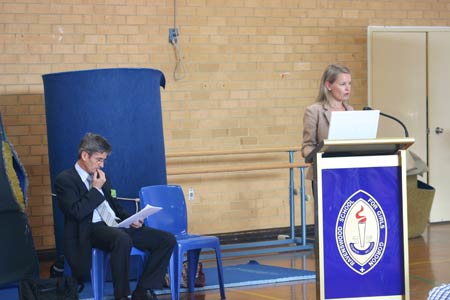
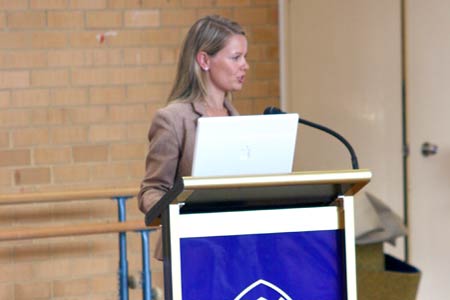
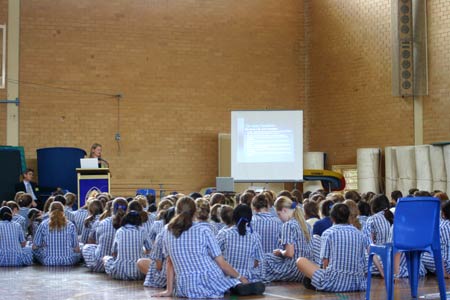
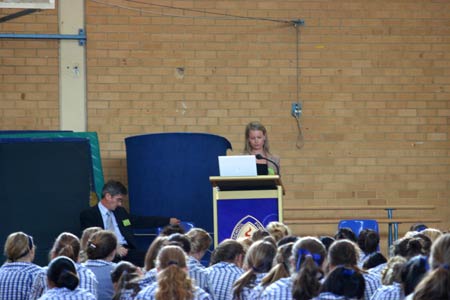
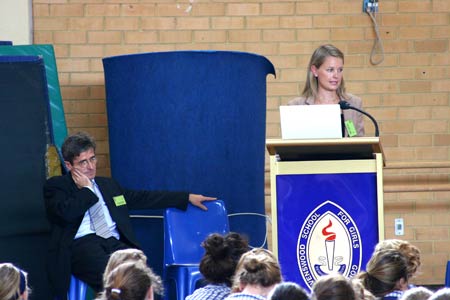
Danae shared something special with the girls. She read out a speech that Anika herself had given for her Cross Curricula Study at SCEGGS Darlinghurst on the subject of mental health. Danae also offered a few personal observations about avoiding tragedies like the Anika story.
Here is the speech Danae gave:
Hello. My name is Danae, and I am Anika Wignall’s sister. The Anika Foundation is named after my sister.
First, I would like to thank Annabelle and Sophie for choosing the Anika Foundation for their presentation to you. And I would like to thank you all, the Year 9 girls at Ravenswood, for voting for the Anika Foundation. It tells us all something that is important: that young people have a lot of issues to deal with while they are going through adolescence. I know that I did. Sometimes it is so hard that depression can follow; and sometimes much worse things can happen if we don’t do something about it. We have to look out for our friends, and if we find someone who is struggling, we have to help them.
I will tell you one thing that is very, very important: help your friends, but if something serious is going on for them, you must get help from counsellors, teachers and parents. You can show your friends our website, which has some useful links to places that can also help. But do not keep secrets if you think it is serious. Some of my sister’s friends kept secrets at an important time. If you have looked at the website, you will know that it did not help her.
Today I want to share something else with you. When Anika was in Year 11 she did her cross curricula study for 'Injustice & Intolerance' on mental health. She was very brave to do that, because she was suffering, and they had not studied mental health as one of the topics. Today I want to read to you what she wrote in her speech, to her year. I will read it to you word for word. It is the first time it has been heard since she stood up in front of everyone and read it out herself at SCEGGS Darlinghurst.
Here is Anika's speech she gave:
“Mental illness is a term that refers to a group of illnesses causing dysfunction to the brain. No matter how much you study or research into mental illnesses, there is only a certain degree of understanding that can be obtained. To one who has not experienced the torment of a mental illness, it is hard to put the anguish into words. Only someone who has endured a mental illness could truly comprehend the suffocating pain, confusion and misery that comes with it. Episodes can come and go in periods through people’s lives. For some people their illness may recur throughout their life, while others may fully recover. Most mental illnesses can be treated to some extent. People who have a mental illness suffer a great deal. They can be disturbed and frightened by their illness, and yet unable to control it.
Mental illnesses can be separated into two main categories: psychotic and non-psychotic. A psychosis is a condition caused by a group of mental illnesses that affect the brain causing changes in thinking, emotion and behaviour. People experiencing a stage of psychosis may lose touch with reality. Their ability to make sense of thoughts, feelings and external information is seriously affected, and they may become very frightened. Psychotic illnesses include schizophrenia and some forms of depression. People with psychosis may develop delusions and or hallucinations. What they may see, smell, feel and hear is real to them, but the people around them do not share their experiences. To those around them, these episodes can be confusing and frightening. Non-psychotic illnesses may include phobias, anxiety, some forms of depression, eating disorders, pain or tiredness and obsessive-compulsive disorder. Everyone has experienced feelings of depression, sadness, tension or fear. However there is a difference between sadness and clinical depression. Some people’s feelings become so disturbing and overwhelming that they have difficulty coping with day-to-day activities such as getting dressed, going to work, and enjoying leisure time and maintaining relationships.
Although these symptoms may or may not be evident to others, they can cause considerable personal distress for continuous time periods. People with a mental illness are seldom dangerous to people around them. Unfortunately myths, misunderstandings, stereotypes and attitudes surround mental illness that result in stigma, isolation and discrimination. After our cross-curricular program studying intolerance and injustice, I chose to base my product on mental illness, an issue which was not addressed in the course, however is no less severe than the other issues discussed. I felt it important to acknowledge the issue as it is strongly linked to the study of injustice and intolerance. People suffering mental illness face discrimination, isolation and stigma.
So for my product I created an awareness brochure to help bring mental illness into the open to help people think about it like other illnesses or conditions, and to educate the community to overcome attitudes based on misconceptions. Along with the brochure I created a collage expressing mental illness. I also organised fundraising for SANE Australia, a charity which supports people suffering from a mental illness. I hope I have helped to promote an issue I strongly believe in."
That is the end of her speech. I want to finish by saying that when Anika was going around and raising the money for Sane Australia, she could not have known that we would be here today at your school, trying to raise money for a charity that bears her name. I am so proud to be here. I am so proud of you girls. That this has happened is a small step for trying to raise awareness about the problems young people have, and to do something about them. I am so glad you recognised this issue as one that is important to you.
